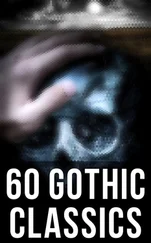Edgar Allan Poe, Mary Shelley, Horace Walpole, William Thomas Beckford, Eliza Parsons, William Godwin, Ann Radcliffe, Matthew Gregory Lewis, Charles Brockden Brown, Jane Austen, Thomas Love Peacock, John William Polidori, Washington Irving, Charles Robert Maturin, James Hogg, Victor Hugo, Frederick Marryat, Nikolai Gogol, Charlotte Brontë, Emily Brontë, James Malcolm Rymer, Thomas Peckett Prest, Nathaniel Hawthorne, George Eliot, Wilkie Collins, Robert Louis Stevenson, Charles Dickens, Joseph Sheridan Le Fanu, Arthur Conan Doyle, Oscar Wilde, Guy de Maupassant, Anna Katharine Green, Charlotte Perkins Gilman, Arthur Machen, George MacDonald, John Meade Falkner, H. G. Wells, Richard Marsh, Henry James, Bram Stoker, W. W. Jacobs, Robert Hugh Benson, Gaston Leroux, Théophile Gautier, William Hope Hodgson, Grant Allen
The Greatest Gothic Classics
Frankenstein, The Castle of Otranto, St. Irvyne, The Tell-Tale Heart, The Phantom Ship, The Beetle…
Published by

Books
- Advanced Digital Solutions & High-Quality eBook Formatting -
musaicumbooks@okpublishing.info
2018 OK Publishing
ISBN 978-80-272-4752-3
Horace Walpole: Horace Walpole Table of Contents
The Castle of Otranto The Castle of Otranto A Gothic Story Table of Contents Preface To The First Edition Preface To The Second Edition Chapter I Chapter II Chapter III Chapter IV Chapter V
William Thomas Beckford: William Thomas Beckford Table of Contents
Vathek Vathek Table of Contents
Eliza Parsons: Eliza Parsons Table of Contents
The Castle of Wolfenbach The Castle of Wolfenbach 1793 Table of Contents Volume One Volume Two
William Godwin: William Godwin Table of Contents
Caleb Williams
Ann Radcliffe:
The Mysteries of Udolpho
The Italian
Matthew Gregory Lewis:
The Monk
Charles Brockden Brown:
Wieland
Jane Austen:
Northanger Abbey
Mary Shelley:
Frankenstein
Eleanor Sleath:
The Orphan of the Rhine
Thomas Love Peacock:
Nightmare Abbey
Edgar Allan Poe:
The Tell-Tale Heart
The Fall of the House of Usher
The Cask of Amontillado
The Masque of the Red Death
The Black Cat
The Murders in the Rue Morgue
John William Polidori:
The Vampyre
Washington Irving:
The Legend of Sleepy Hollow
Charles Robert Maturin:
Melmoth the Wanderer
James Hogg:
The Private Memoirs and Confessions of a Justified Sinner
Victor Hugo:
The Hunchback of Notre-Dame
Frederick Marryat:
The Phantom Ship
Nikolai Gogol:
St, John’s Eve
The Viy
The Mysterious Portrait
Bram Stoker:
Dracula
The Jewel of Seven Stars (Original 1903 Edition)
Emily Brontë:
Wuthering Heights
James Malcolm Rymer and Thomas Peckett Prest:
The String of Pearls; or, Sweeney Todd, the Demon Barber of Fleet Street
Nathaniel Hawthorne:
The House of the Seven Gables
Rappaccini's Daughter
The Birth Mark
George Eliot:
The Lifted Veil
Wilkie Collins:
The Woman in White
Robert Louis Stevenson:
Strange Case of Dr Jekyll and Mr Hyde
Charles Dickens:
The Mystery of Edwin Drood (Unfinished)
Joseph Sheridan Le Fanu:
Carmilla
Uncle Silas
Arthur Conan Doyle:
The Hound of the Baskervilles
Oscar Wilde:
The Picture of Dorian Gray
Guy de Maupassant:
The Horla
Anna Katharine Green:
The Forsaken Inn
Charlotte Perkins Gilman:
The Yellow Wallpaper
Arthur Machen:
The Great God Pan
George MacDonald:
Lilith
John Meade Falkner:
The Lost Stradivarius
H. G. Wells:
The Island of Doctor Moreau
Richard Marsh:
The Beetle
Henry James:
The Turn of the Screw
W. W. Jacobs:
The Monkey's Paw
Robert Hugh Benson:
The Necromancers
Gaston Leroux:
The Phantom of the Opera
Théophile Gautier:
Clarimonde
The Mummy's Foot
William Hope Hodgson:
The House on the Borderland
The Boats of the Glen Carrig
Grant Allen:
Wolverden Tower
Table of Contents
The Castle of Otranto
A Gothic Story
Table of Contents
Preface To The First Edition
Preface To The Second Edition
Chapter I
Chapter II
Chapter III
Chapter IV
Chapter V
Horace Walpole, the fourth son of Sir Robert Walpole, was born at 17 Arlington Street on 24 September, 1717. He spent the greater part of his boyhood at his father’s house in Chelsea, a building that is now part of the Hospital. At Eton, Walpole did not distinguish himself in any way. After leaving Cambridge in 1737, his father appointed him Inspector of Imports and Exports in the Customs House, and, in the following year, Usher to the Exchequer. In 1739 he began the usual “grand tour” on the Continent, where he developed a passion for antiquities. He returned to England at the end of 1741. His father died in March 1745, and in 1747 Walpole settled in the neighbourhood of Twickenham at Strawberry Hill. The transforming of this house into “a little Gothic castle” and museum was the chief occupation of the greater part of his life. Here he erected a private printing press on which he printed many of his own works as well as some poems of Gray. Although never really interested in politics, in 1754 Walpole entered Parliament as member for Castle Rising in Norfolk, vacating this seat three years later for that of Lynn. About this time, too, he made an unsuccessful attempt to save the unfortunate Admiral Byng. He went to Paris in 1765, where he formed a friendship with Madame du Deffand which lasted until her death in 1780. But from 1769 until his death, his life, apart from intermittent literary work and adding to his museum, was comparatively uneventful. In 1773, however, his comedy Nature Will Prevail was acted at the Haymarket with considerable success. In 1791, on the death of his brother, he acceded to the Earldom of Orford. He died at what was then 40 Berkeley Square on 2 March, 1797.
Preface To The First Edition
Table of Contents
The following work was found in the library of an ancient Catholic family in the north of England. It was printed at Naples, in the black letter, in the year 1529.
Читать дальше













